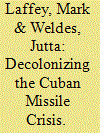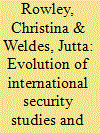| Srl | Item |
| 1 |
ID:
083537


|
|
|
|
|
| Publication |
2008.
|
| Summary/Abstract |
Postcolonial scholars show how knowledge practices participate in the production and reproduction of international hierarchy. A common effect of such practices is to marginalize Third World and other subaltern points of view. For three decades, analysis of the Cuban missile crisis was dominated by a discursive framing produced in the ExComm, one in which Cuba was invisible. The effort to produce a critical oral history enabled Cuban voices-long excluded from interpretive debates about the events of October 1962-to challenge the myth of the crisis as a superpower affair. Despite the oral history project's postcolonial intervention, however, and greater attention to Cuba's role in the crisis, this framing persists and is reproduced in the micro-practices of scholarship. Decolonizing the crisis, and by extension the discipline itself, is not easy to do.
|
|
|
|
|
|
|
|
|
|
|
|
|
|
|
|
| 2 |
ID:
119999


|
|
|
|
|
| Publication |
2012.
|
| Summary/Abstract |
Security studies is again reflecting on its origins and debating how best to study in/security. In this article, we interrogate the contemporary evolutionary narrative about (international) security studies. We unpack the myth's components and argue that it restricts the empirical focus of (international) security studies, limits its analytical insights, and constrains the sorts of interlocutors with whom it engages. We then argue that these limitations can at least partially be remedied by examining the performance of identities and in/securities in everyday life. In order initially to establish the important similarities between (international) security studies and the everyday, we trace elements of the evolutionary myth in Buffy the Vampire Slayer and Angel - which both stand in for, and are, the everyday in our analysis. We then argue that the Buffyverse offers a complex understanding of (identities and) in/security as a terrain of everyday theorizing, negotiation and contestation - what we call the 'entanglement' of in/security discourses - that overcomes the shortcomings of (international) security studies and its myth, providing insights fruitful for the study of in/security. In conclusion, we briefly draw out the implications of our analysis for potential directions in (international) security studies scholarship and pedagogy.
|
|
|
|
|
|
|
|
|
|
|
|
|
|
|
|